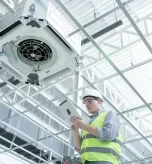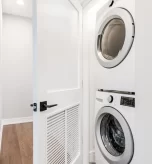Heating, ventilation, and air conditioning (HVAC) systems are essential for home comfort, safety, and energy efficiency. Are you getting ready for a seasonal checkup or a full property inspection?
Knowing what an HVAC system inspection includes is essential. This knowledge helps you make better choices about maintenance and repairs. This guide covers what you need to know about HVAC inspections. It explains what inspectors check and how they can help you avoid expensive problems.
Why HVAC Inspections Matter?
Regular HVAC inspections are crucial for running your system efficiently and extending its lifespan. These inspections help:
- Identify and prevent potential breakdowns
- Improve system efficiency
- Ensure indoor air quality and safety
- Lower utility bills by detecting energy losses
- Maintain warranty validity
A heating and air inspection is crucial before buying or selling a home. You also need it after installing a system or when your unit does not work well.
What Is an HVAC Inspection?
An HVAC inspection thoroughly examines your heating and cooling systems to assess their functionality, safety, and efficiency. The process includes checking components like the furnace, air conditioner, heat pump, ductwork, and thermostat.
Professional HVAC inspection services use a residential HVAC inspection checklist to ensure they evaluate every part. The goal is to check the AC unit or heat pump. We want to find early signs of wear, poor performance, or safety issues.
When Should You Schedule an HVAC Inspection?
Here are a few ideal times to consider an HVAC inspection:
- Before seasonal changes: Especially before summer or winter.
- During a home inspection: If you’re buying or selling a home.
- After installation: To ensure proper setup and functionality.
- When HVAC is not working properly: To troubleshoot HVAC issues efficiently.
What Inspectors Check During an HVAC Inspection?
Let’s explore what a typical HVAC examination covers:
1. Thermostat Calibration
Inspectors verify that your thermostat reads and regulates temperatures accurately. This ensures that you keep your home comfortable and optimize energy usage.
2. Air Filter Condition
Filters are checked for dirt or clogs that could restrict airflow and reduce indoor air quality.
3. Electrical Components
All wiring, fuses, and electrical connections are inspected for safety and wear. Faulty wiring can lead to major system failures or safety hazards.
4. Refrigerant Levels (For AC Units)
Air conditioning inspections include checking refrigerant levels to ensure cooling performance. Low refrigerant could indicate a leak or improper charging during installation.
5. Airflow and Ductwork
The inspector will test for consistent airflow and look for leaks, blockages, or damage in the duct system.
6. Blower and Motor Functions
Technicians inspect the system’s blower fan and motor to confirm they operate smoothly and efficiently.
7. Heat Exchanger and Burners (For Heating Systems)
This part of a heating and cooling inspection checks for cracks or rust that could lead to carbon monoxide leaks.
8. Condensate Drain and Pan
An often-overlooked part of HVAC inspections is checking the condensate drain for clogs that can cause water damage.
9. System Controls and Startup Cycle
Inspectors will watch how the system starts, runs, and shuts down. They will check that all safety features and controls work as they should.
10. Noise and Vibration Assessment
Unusual sounds or vibrations could be signs of wear, loose parts, or motor issues that need fixing.
Residential HVAC Inspection Checklist
Here’s a general checklist used in most HVAC inspections:
- Check thermostat operation
- Examine air filters
- Test electrical connections
- Measure refrigerant levels (AC)
- Assess airflow from vents
- Inspect blower components
- Evaluate the heat exchanger
- Inspect burners and ignition (furnace)
- Examine ductwork
- Test the condensate drain
- Evaluate safety controls
- Inspect the outdoor unit (AC/heat pump)
- Listen for unusual sounds
Common Issues Found During HVAC Inspections
- Clogged filters reduce airflow and efficiency
- Refrigerant leaks affecting cooling performance
- Dirty coils lowering heat exchange
- Worn belts or motors leading to system failure
- Improper installations from recent setups
- Thermostat malfunctions causing inconsistent temperatures
Addressing these problems early saves you from expensive repairs later.
How Much Is an HVAC Inspection?
The cost of an HVAC inspection depends on the complexity of the system and the service provider. On average, a routine heating and air inspection ranges between $100 and $250. Prices may be higher if the inspection includes more advanced diagnostics or is part of a real estate transaction.
At Key Property Inspection Group, we provide comprehensive HVAC inspection services tailored to homes in Riverside, California. Our certified inspectors use proven methods to ensure your heating and cooling systems function safely and efficiently.
What Happens After the Inspection?
After the inspection, you’ll receive a detailed report outlining:
- The condition of each HVAC component
- Any safety concerns or system inefficiencies
- Recommended repairs or maintenance tasks
You can use this report to plan future services. You can also negotiate repairs if you are selling your home. It can help you feel better about your system’s health.
Benefits of Regular HVAC Inspections
- Energy savings from optimized system performance
- Better air quality through cleaner filters and ducts
- Improved comfort with better airflow and temperature control
- Fewer emergencies by catching issues early
- Longer system lifespan with proactive maintenance
FAQs
1. What is HVAC inspection?
An HVAC inspection is a check of your heating and cooling systems. It makes sure they are safe, efficient, and working well.
2. How often should I schedule an HVAC inspection?
Most experts suggest checking your HVAC system at least once a year. It is best to do this in spring for cooling and in fall for heating.
3. Can I troubleshoot HVAC issues myself?
You can change filters by yourself, but most HVAC problems need a trained professional to diagnose and fix them safely.
4. What are the HVAC inspection requirements in California?
The law does not require HVAC inspections for every home. However, they are often necessary during home sales, major renovations, or new installations to ensure that the systems meet the code.
5. What if my HVAC is not working?
If your system is not heating or cooling properly, an inspection can help find the problem. It could be the thermostat, motor, refrigerant, or other parts.
Final Thoughts
HVAC inspections are an essential part of responsible homeownership. They give you information about your system’s health.
This helps you make smart maintenance choices and keeps your living space safe and comfortable all year. If you are in Riverside, California, and need HVAC inspection services, Key Property Inspection Group can help. We offer professional evaluations you can trust.
Are You Looking for Reliable Inspection Services?
We provide professional property inspection services across Riverside, California, and surrounding areas. Whether you’re buying, selling, or maintaining a property, our expert team is here to help. We proudly serve clients in the following locations:
| Agoura Hills | Alhambra | Arcadia | Artesia | Avalon | San Marino |
| Azusa | Baldwin Park | Bell | Bellflower | Bell Gardens | Signal Hill |
| Beverly Hills | Bradbury | Burbank | Calabasas | Carson | Torrance |
| Cerritos | City of Industry | Claremont | Commerce | Compton | Santa Clarita |
| Covina | Culver City | Diamond Bar | Downey | Duarte | South El Monte |
| El Monte | El Segundo | Gardena | Glendale | Glendora | Vernon |
| Hawaiian Gardens | Hawthorne | Hermosa Beach | Hidden Hills | Huntington Park | Santa Fe Springs |
| Inglewood | Irwindale | La Cañada Flintridge | La Habra Heights | Lakewood | South Gate |
| La Mirada | Lancaster | La Puente | La Verne | Lawndale | Walnut |
| Lomita | Long Beach | Los Angeles | Lynwood | Malibu | Santa Monica |
| Manhattan Beach | Maywood | Monrovia | Montebello | Monterey Park | South Pasadena |
| Norwalk | Palmdale | Palos Verdes Estates | Paramount | Pasadena | West Covina |
| Pico Rivera | Pomona | Rancho Palos Verdes | Redondo Beach | Rolling Hills | Sierra Madre |
| Rolling Hills Estates | Rosemead | San Dimas | San Fernando | San Gabriel | Temple City |
No matter where you’re located within these areas, our inspection experts are ready to assist you. Reach out today to schedule your inspection!





